British overall winner for Fastnet Race
Published on August 13th, 2021
(August 13, 2021) – Tom Kneen’s JPK 11.80 Sunrise has been crowned overall winner of the 49th Rolex Fastnet Race. After being confirmed as runaway winner of the IRC Two division yesterday, the Royal Ocean Racing Club confirmed today that no other boat still racing on the 695 nautical mile course can catch the British boat for overall honors.
Kneen is the first British winner of the race since Charles Dunstone and his maxi Nokia Enigma in 2003.
“I’ve had 24 hours to reflect on the race after we finished yesterday, and it really is all about the people, the amazing team that sailed with me, and my incredible partner Francesca who has done so much to make this happen,” said Kneen.
For someone who only took up offshore racing seven years ago, Kneen has come a long way in a short time. When he started he admits, “I didn’t know what IRC was. I’d never really heard of the RORC, but what I had heard of was the Rolex Fastnet Race. I was brought up in the southwest, and as a boy I used to sail dinghies at the Royal Western Yacht Club.”
By his own admission, Kneen’s first Rolex Fastnet Race in 2015 was a comedy of errors aboard his secondhand Elan 350 cruiser/racer called Sunrise. But he has proven to be a fast learner who has quickly worked out what it takes to put together a race-winning campaign.
“It doesn’t really matter what level in the fleet you’re at. As long as you have a good crew, and the right support, then you can win your class. And if you can win the class you can win overall, although that depends on things like tidal gates, wind conditions, things that are much more in the hands of the gods, I think.”
The fickleness of fate was brought home to him on seeing sistership Dawn Treader knocked out of the race not long after the start. Battling through the severe conditions of the Solent, the J/133 Pintia collided with the JPK 11.80 Dawn Treader, resulting in the latter dismasting and both boats retiring.
Two identical boats – one that barely made it past the start line, the other going on to win the race. The poignancy was not lost on Kneen.
“We had a sad moment for an hour or so after that happened,” shared Kneen. “We’ve been racing Dawn Treader hard all season. They’ve had the boat for a lot less time than us, but really got it together. We were looking forward to match racing them all around the Fastnet course and we reckoned that if we could beat them we’d be in with a good chance of winning our division.”
Sunrise struggled in the early stages of the race, always out of phase with the tide as they beat towards Land’s End. But a counterintuitive and brave decision to sail around the eastern side of the traffic separation scheme at Land’s End was the team’s first big break. From then on, one good decision compounded on the next.
This put them in a unique position to stay just in front of an area of high pressure that swallowed up the chasing pack just a few miles behind Sunrise.
“I was looking at the tracker last night and it’s quite amazing to look back at that stage of the race,” Kneen reflected. “It was a critical moment where we really pushed hard and it was probably the difference between finishing at 10 o’clock in the morning on Thursday (August 12) or finishing the same time the following day.”
By staying ahead of the high pressure system, Sunrise had done a horizon job on the rest of IRC Two. It was a breakaway move that ultimately proved sufficient to overhaul RORC Commodore James Neville’s HH42 Ino XXX and claim the Fastnet Challenge Cup for the overall winner under IRC corrected time.
Loyal Plymothian that he is, Kneen admits to being pleasantly surprised by the warm welcome he received coming into Cherbourg. “It’s not lost on me the irony that the first year the race finish moves to a French town it’s won by a Plymouth boat, by someone who voted against moving the finish to Cherbourg.”
Kneen paid tribute to the RORC and everyone in Cowes and Cherbourg who had helped make the Rolex Fastnet Race happen in such challenging circumstances. “I think anyone who has managed to arrange an event in this pandemic deserves a medal.
“The level of complexity of making anything happen is just at a completely different level now in the pandemic. The fact that the RORC made a brave decision to move the finish, and then managed to deliver another astonishing race – it just demonstrates the amazing people at the RORC have got in it.
“I wasn’t particularly positive about the change of finish because I’m loyal to Plymouth, and we really didn’t know what to expect when we arrived in Cherbourg. But the welcome at the finish was amazing, the village is something else, the whole experience was incredible.
“If I have one regret it’s that in this special moment, Francesca wasn’t able to be with me on this race because she was back at home looking after our two year old. She is the one who has made it possible for me to do this race.
“When you make crazy plans to do things like this and it becomes a bit of an obsession, and you never really believe you’re going to do it. I think all of us in offshore sailing ask ourselves why we commit to this ridiculous sport where you get mostly cold and wet, and 90 per cent of the time you wish you weren’t there.
“But then you get glimmers of complete elation, adrenaline and an experience that is just unmatchable. There’s no greater sense of achievement.
“When you get everything in the right place, with the right people, in the right conditions. We had four, five or six hours of that, between the Scillies and the Lizard, when we had 25 knots of breeze and the boat – our so called ‘caravan’ – was flying along at 20 plus knots.
“In moments like that, all the rest of it you forget very quickly, when you’re beating in 30 knots of wind and vomiting over the back and wondering why you’re there. It’s the moments of elation that live with you, and it’s what keeps us coming back.”
Volvo Ocean Race veteran Dave Swete was the only pro sailor on the Sunrise crew. Apart from Swete and Kneen in their late 30s, the rest of the crew are all in their 20s, some of whom have come up through the RORC’s Griffin youth racing programme aimed at fostering young offshore talent. Suzy Peters and Tom Cheney were co-navigators on the race. They were joined by Quentin Bes-Green, Angus Gray-Stephens, George Kennedy, and Victoria Tomlinson.
Victory for Loison as IRC Three and Two-Handed goes to the wire
One of the most intense battles, both on the water and under IRC corrected time, played out in IRC Three. Here the scratch boat was unquestionably the JPK 1030 Léon, skippered by the defending IRC Three and Two-Handed champion and former overall winner of the Rolex Fastnet Race, Alexis Loison, racing yet again doublehanded, but this time with Guillaume Pirouelle.
Interesting was the diversity of crew make-ups: Fully crewed, doublehanded or mixed doublehanded, it seemed to make no difference to the competitiveness of the top boats. While the lead doublehanders in IRC Four were occasionally in the mix, it was mainly the doublehanded crews in IRC Three that held the top places in the IRC Two-Handed ranking.
After surviving the brisk start, the battle for the front of IRC Three, as the boats tackled the stiff beat down the Channel, as usual was down to picking the shifts and playing the tide.
Sadly some British Sun Fast 3300s teams had not made it through – Kelvin Rawlings and Stuart Childerley (hoping to repeat their IRC Two-Handed victory from 2015) opted out of the race as James Harayda and Dee Caffari on Gentoo retired with a ripped mainsail.
Another, Swell, sailed by double Olympic gold medallist Shirley Robertson and Volvo Ocean Race sailor Henry Bomby, was also having a hard time having been OCS, although they had managed to recover well from their premature start, overhauling Léon by the Needles.
But then as Bomby recounted, they “got Portland Bill wrong – we were playing for a left shift, so our main rivals got four or five miles ahead of us in the first six hours. So we had to play catch up from there.”
At 0600 on the first morning, the Sun Fast 3600 Fujitsu British Soldier skippered by Henry Foster, had nosed into the lead, hugging the shore at Start Point with Louis-Marie Dussere’s JPK 1080 Raging-bee², Philippe Girardin’s J/120 Hey Jude and Raging-bee² neck and neck for the lead to the south. The British army remained out in front as they sniggled around the Lizard coastline and continued on in the lead – just – as they diving south of the Land’s End TSS and up its west side.
At the Fastnet Rock on the early hours of Wednesday morning, it remained tight on the water, but the lower-rated Léon led over Raging-bee² and Hey Jude by 45 minutes with Fujitsu British Soldier 13 minutes further back. At this stage Swell was 1 hours 19 minutes behind under corrected time.
Half way into the return journey to Bishop Rock Fujitsu British Soldier and Hey Jude stayed west as Raging-bee² had nosed ahead of Léon to the east. By being further east still, Swell gained by being able to lay the east side of the TSS west of the Scilly Isles, as the boats ahead lost out, having to gybe to avoid it.
But the major hurdle ahead was the ridge that engulfed the fleet late on Wednesday (August 11) into the early hours of Thursday, that parked the fleet. Here the Fujitsu British Soldier crew made the decision to head west of the TSS. This worked out badly for them and they remained more firmly stuck than the boats to the east. Hey Jude and Swell came out best in this reshuffle along with doublehanders Olivier Burgaud and Sylvain Pontu on their JPK 1080 Aileau just to their south.
The long reach back east down the Channel was when the Brits on Swell finally edged into the lead on the water and then, unimaginably, ahead of Loison under IRC corrected time. Here the frontrunners were all laying the south side of the Casquets TSS until Léon edged south and Swell began to cover her vigorously, however, this tactic left Aileau free to sail a path closer to the TSS and the rhumb line and take the lead on the water.
Swell did well to stay in front of Léon, but on the approach to Cherbourg the local sailing demi-Gods on their lowered rated JPK 10.30, gybed closer to Cap de la Hague and were able to close enough on Swell to beat them by 36 minutes under corrected time at the line.
“I am very happy to win again and very pleased with our performance,” commented Loison, a professional Figaro sailor. “We pushed very hard on board and that is good for Guillaume and me. We trained well together for all of this year with the Figaro, so to win our class in the Rolex Fastnet Race is a great thing to have happened.”
Throughout the race, Léon found herself in much closer competition than when Loison and JPK boss Jean-Pierre Kelbert were the runaway IRC Three and Two-Handed winners in 2019. “Maybe because the weather was different, and I think because all of the Two-Handed crews have worked a lot to produce a better performance,” muses Loison over why it was closer this year.
“We have seen a lot of well prepared boats, especially in IRC Two-Handed, like Shirley and Henry. They were very strong and made a good come back at the end. After the Scillies, Swell sailed very fast and we could not do anything, but have a little cry! However near the end, Swell went further south and had less wind than us and we could come back.
“Another Two-Handed team Aileau took a very good option near the end, so we had to worry about them too. The Rolex Fastnet is always a difficult race, there is a lot of options and a lot of boats, so it is impossible to control all of the boats. We chose our tactics looking at Swell, and didn’t consider Aileau. The Raz Blanchard [Alderney Race] produces a new complexity to the race, but it is a good finish.”
Léon’s 27-year-old co-skipper Guillaume Pirouelle, a past winner of the Tour de France à la Voîle, is being groomed by Loison to take over the Région Normandie Figaro campaign from him in 2022.
“It is a pleasure to race with Alexis and a great opportunity to learn from his knowledge,” said Pirouelle. “We have had a great season in the Figaro, so to finish first in the Rolex Fastnet Race is so good. I am very happy.”
Robertson and Bomby had to make do with second place both in IRC Three and Two-Handed. While strong contenders in this fleet, after their disappointing first six hours, even at the Scillies on their return journey, a podium position, and certainly a second place, seemed impossible.
“If you had asked us at the Scillies I would have said it was a long shot,” said an exhausted looking Bomby. “Then as we started making progress I started to believe it was possible.”
Robertson, better known for inshore racing, seemed exhausted to the point of dropping as Swell docked in Cherbourg’s Port Chantereyne.
“It was so intense- it feels like we’ve raced around the planet!” admitted the two time Olympic champion turned TV presenter. “It feels like I’ve been away a lot longer than five days. There were some really hard days and some really amazing days when we’ve grinned from ear to ear. To be right in the thick of it, battling for first place, was amazing.
“Henry is an amazing talent. He always believed that somewhere along the line we would be able to get back into them.”
Among the contenders for IRC Three honours, Léon had some strong rivalry from another successful Cherbourg boat, Raging-bee². Ultimately Louis-Marie Dussère’s JPK 10.80 lost ground in the Channel and finished third on corrected time 44 minutes, behind Swell.
“We were very pleased to be the first to the Fastnet Rock as we knew from the beginning of the race that Alexis Loison would win!” declared Dussère. “But for this race we had a good fight with him, always close and that was new for us and the first time we have crossed the finish line ahead of him.
“For me the new course is better because on the old course, when you passed the Scillies, the race was almost over. Now when you arrive at the Scillies it is not finished at all! At Alderney, Aileau was one mile behind us. We went south for more tide and Aileau went north and after that that she was five miles ahead. But at the finish Aileau lost the wind and we passed them.”
Race information – Tracker – Results
The 49th edition of the biennial Rolex Fastnet Race started from the Royal Yacht Squadron line on August 8 in Cowes, UK with the finish line moved from Plymouth, UK to Cherbourg, France, extending the distance from 608 to 695 nm. The 2021 race had seven divisions for the 337 starters from 24 nations including Japan, Mexico, and eight from the USA, but the majority from Europe, including the largest ever turn-out from France.
Source: RORC


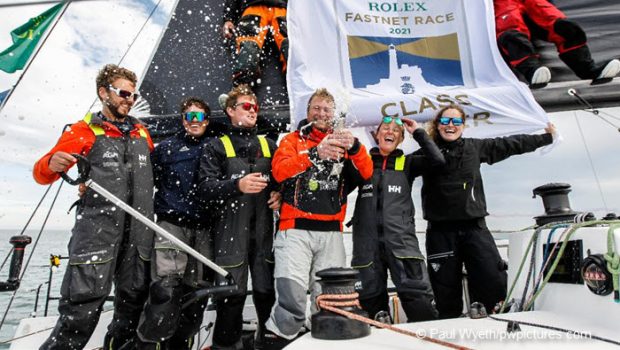

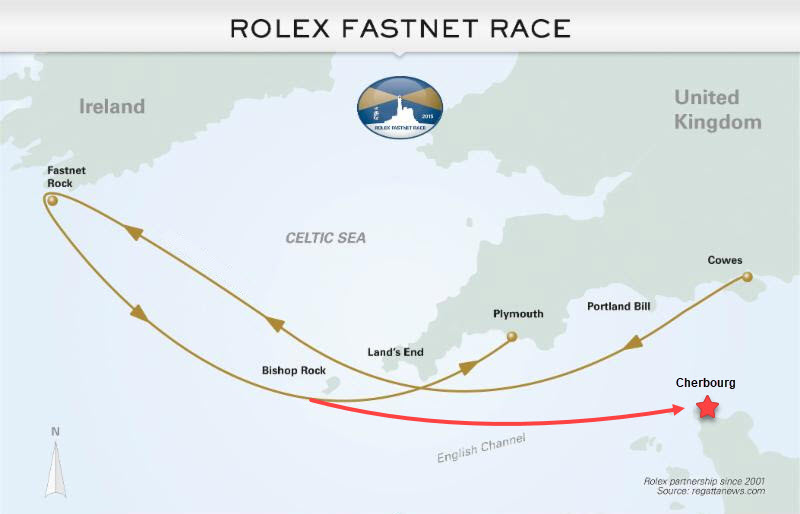

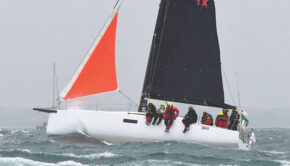
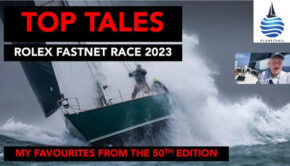
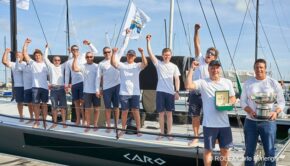
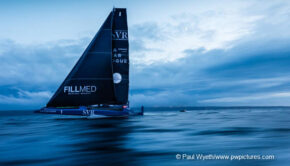
 We’ll keep your information safe.
We’ll keep your information safe.